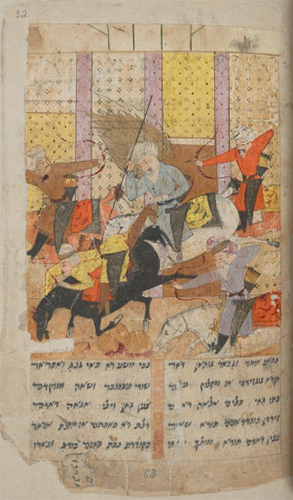
Jews have lived among Persian speakers, and spoken Persian dialects, since at least the period of the Achaemenid Empire (550 BC–330 BCE). Influences from Iranian linguistic and literary traditions are evident in post-exilic books of the Hebrew Bible and apocrypha, in addition to Second Temple and classical rabbinic traditions. The rise of Persian literature written by Jews in Hebrew script coincided with the New Persian literary renaissance that began in the eighth century CE. Today, Jewish communities with roots in Iran, Central Asia, the Caucasus, and elsewhere continue to write and speak in dialects of Persian, but these have yet to receive a degree of popular or scholarly consideration commensurate with their status as historically-significant and enduring Jewish languages.
The Fath-Nāmeh or “Book of Conquests” is a versified rendition of stories from the books of Joshua, Judges, Ruth, I Samuel, and II Samuel in Judeo-Persian (New Persian written with Hebrew characters) by the poet ‘Imrāni. ‘Imrāni lived in Isfahan and Kashan during the late Timurid and early Safavid periods (15th/16th century CE) and composed in the masnavī poetic style—in rhyming couplets following a meter of eleven syllables—comparable in form to the Masnavi-e Ma’navi (“Spiritual Couplets”) of the 13th-century poet Rumi. Like similar works by his predecessor, Mowlānā Shāhin-i Shirāzi, and his successors, Aḥaron ben Mashiaḥ and Khwājaj Bukhārā’ī, the Fatḥ-Nāmah is an example of Jewish ‘rewritten bible’ in the Iranian epic mode exemplified by the Shāh-Nāmeh (“Book of Kings”) of Ferdowsi (10th/11th century). Rhetorical, symbolic, and thematic elements also recall the Leili o Majnun (“Layla and Majnun”) of Nizami Ganjavi (12th/13th century) and the poetry of Hafez (14th century).
While he employs recognizably Islamic terminology such as tahlīl (“praise” of God, usually referring to the first portion of the Muslim shahādah formula) and tawḥīd (“oneness” of God), ‘Imrāni’s frequent inclusion of Hebrew words—sometimes with Persian endings e.g. kohen-ān—points to his Jewish background, as do his choices of source material. Other works by ‘Imrāni include (1) the Sufi-influenced Ganj-Nāmeh (“Book of Treasure”), a versified rendering of the first four chapters of the Mishnaic tractate Avot; (2) the Ḥanukkah-Nāmeh or Ẓafar-Nāmeh (“Book of Victory”), which relates the Maccabean narrative; (3) midrashic retellings of the ten Jewish sages martyred during the reign of Hadrian, of the seven sons of Hannah martyred during the Hasmonean revolt, and of the sacrifice of Isaac; (4) a treatise based on Maimonides’ Thirteen Principles; and (5) poetic works on themes of moral, religious, and practical instruction.
The Fath-Nāmeh also refers to stock themes and characters from the Iranian epic tradition—such as the equation of the reign of the biblical king Saul to that of the Pishdadian ruler Jamshid and the use of symbolic imagery from Ferdowsi’s Shāh-Nāmeh. Passages that relate didactic advice reflect the Pahlavi andarz (“instruction”) traditions associated with Ādurbād ī Mahrspandān and other Sasanian-era Zoroastrian figures. Accompanying illustrations, as Orit Carmeli observes, reflect styles known from other Persian manuscripts of the Safavid and early Qajar periods. Vera Basch Moreen’s English translation constitutes a significant advance in rendering such material for non-specialists, spotlighting the richness of the Judeo-Persian tradition within the broader oeuvre of Jewish literature.
Delve into Judeo-Persian:
- Read about Judeo-Persian at the Jewish Languages Project and in Encyclopedia Iranica
- Browse UCB books in and about Judeo-Persian
- Study Persian and Hebrew in the UCB Department of Near Eastern Studies
Contribution by Alexander Warren Marcus
PhD Student, Department of Religious Studies, Stanford University
~~~~~~~~~~
Title: Fath Nāma
Title in English: The Book of Conquests
Author: Emrānī, 1454-1536
Imprint: 1675-1724
Edition: Original manuscript
Language: Judeo-Persian
Language Family: Indo-European, Indo-Iranian
Source: The British Library
URL: http://www.bl.uk/manuscripts/FullDisplay.aspx?ref=Or_13704
Select print editions at Berkeley:
- The Bible as a Judeo-Persian Epic : an Illustrated Manuscript of ‘Imr̄anī’s Fatḥ-Nāma = Miḳra ke-epos Parsi-Yehudi : ketav yad meʼuyar shel ha-Fatḥ-Namah le-ʻImrani / Vera Basch Moreen with Orit Carmeli. Jerusalem : Ben Zvi Institute for the Study of Jewish Communities in the East, 2016.
The Languages of Berkeley is a dynamic online sequential exhibition celebrating the diversity of languages that have advanced research, teaching and learning at the University of California, Berkeley. It is made possible with support from the UC Berkeley Library and is co-sponsored by the Berkeley Language Center (BLC).
Follow The Languages of Berkeley!
Subscribe by email
Contact/Feedback
ucblib.link/languages
![The Languages of Berkeley [fan]](https://update.lib.berkeley.edu/wp-content/uploads/2019/02/fan_languages-450px.jpg)